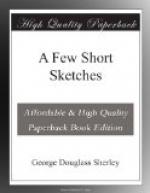Her final gift, the scarf-pin, with the big pearl and little diamonds, met with some mysterious disposition. In telling me the story in the French cafe, he hesitated, spoke vaguely, and finally refused to state just what he had done with the pin. He may have dropped the pearl, like Cleopatra, in a goblet of ruby wine and drained the contents with the dissolved jewel for dredges and for luck, and he may have given the pretty little diamonds to news boys or small negroes wandering haphazard about the highways of his town. Anyhow, this much is sure, it was given away—that much he made clear.
When he fell upon the letters with an idea of burning them—which I believe is more general than the returning of them—he fortunately bethought himself of publishing them—just as they were. And lo! then was born his “Perfected Letter Writer,” which enabled him to leave a bequest of many thousand dollars to Harvard College, where he was educated, and also a certain sum of money to be discreetly distributed each year among the deserving and bashful young men of Boston, between the ages of eighteen and twenty-three, to be used by them in making Christmas gifts to worthy young women of their choice.
As might have been expected, that clause of his will was successfully contested, on account of its vagueness, by his brother and sister, who morally, if not legally, cheated the “Bashful Young Men of Boston” out of a unique and much deserved, much needed inheritance. This cure for heart-break must be a severe but effectual one. When I met George Addison in Paris, then an old man, he was as rosy as a ripe apple, and just as mellow. He was gracious, kindly, and had learned well the difficult art of growing old with grace, and without noise. He dated his success, his happiness too, from the moment he made the resolution to trample on his feelings and rid himself in that novel method of every tangible vestige of that past, which he got rid of by gift, not burial. Therefore, he had no ghostly visitors—no useless regrets.




